Defying gravity: Richard Browning flies across Wellington
14 Nov 2018
[wellington_wistia]sa1r8gzdn3[/wellington_wistia]
On Tuesday 13th November, Wellington received a special visit from Richard Browning, British inventor and founder of Gravity Industries, who has created the world’s first body jet suit that genuinely allows the wearer to live out the dream of flying.
 Richard first delivered a short presentation to a packed and buzzing College Theatre on the background, development history and technical capabilities of the jet suit, much in the style of the TED talks he has given on his incredible invention. He briefly outlined how a “bonkers” (his words!) idea to learn how to augment the human body to fly turned into a fully realised and commercially viable product within the space of around two years.
Richard first delivered a short presentation to a packed and buzzing College Theatre on the background, development history and technical capabilities of the jet suit, much in the style of the TED talks he has given on his incredible invention. He briefly outlined how a “bonkers” (his words!) idea to learn how to augment the human body to fly turned into a fully realised and commercially viable product within the space of around two years.
 Richard’s jet suit cost roughly $50,000 to develop, and utilises a lightweight exoskeleton and a combination of kerosene-fuelled micro gas turbines strapped to his arms and back to allow him to control 130kg of thrust, sufficient to propel him off the ground and actually fly for sustained periods of time. Richard himself set the Guinness World Record for “the fastest speed in a body controlled jet engine powered suit” on 9th November 2017 by travelling at roughly 32mph, a speed that he and his team have subsequently broken many times.
Richard’s jet suit cost roughly $50,000 to develop, and utilises a lightweight exoskeleton and a combination of kerosene-fuelled micro gas turbines strapped to his arms and back to allow him to control 130kg of thrust, sufficient to propel him off the ground and actually fly for sustained periods of time. Richard himself set the Guinness World Record for “the fastest speed in a body controlled jet engine powered suit” on 9th November 2017 by travelling at roughly 32mph, a speed that he and his team have subsequently broken many times.
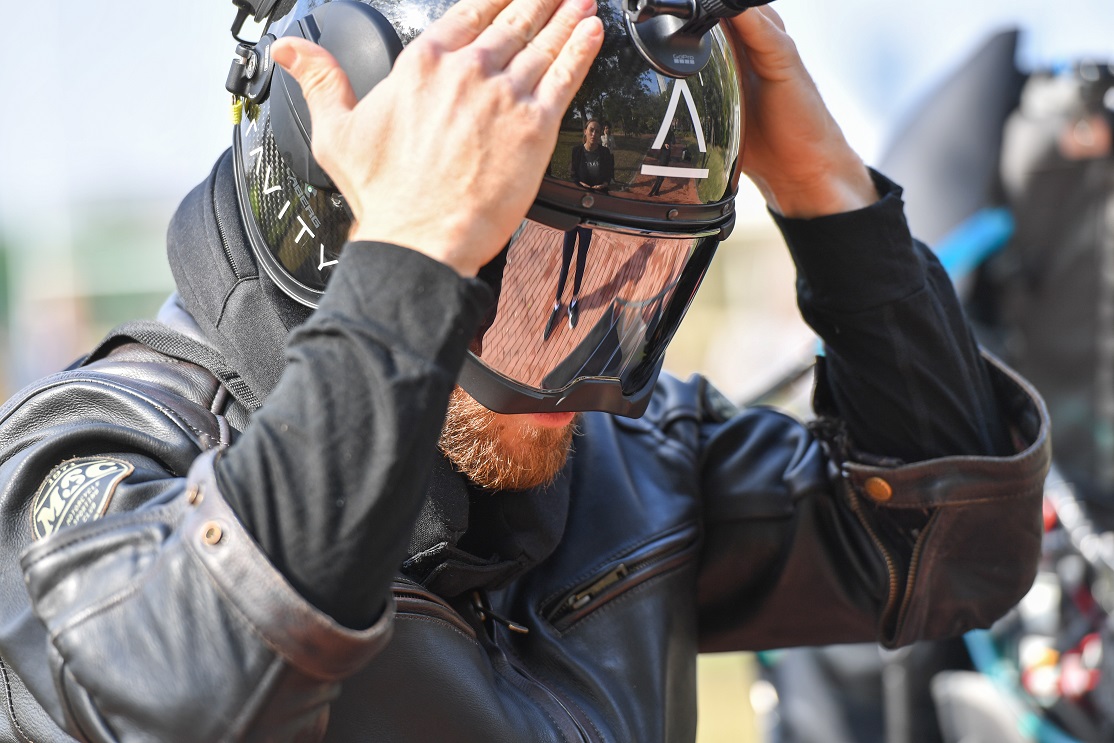 After the presentation, Richard kindly made time for a Q&A, where a veritable forest of hands shot up amongst the watching Wellingtonians. From the calibre of their questions, it was clear that the pupils were not only fascinated by the jet suit itself, but also its potential impact on the wider world and the very nature of inventing. The following is just a short sample of the many well-considered questions they put to Richard:
Did you think that your idea would get this far?
Richard: I hoped that it would, but you never know how these things will turn out! I think that in the back of any inventor’s mind is the knowledge that your idea may fail to come to fruition, but if you care about the idea enough, then you owe it to yourself to give it your best effort.
After the presentation, Richard kindly made time for a Q&A, where a veritable forest of hands shot up amongst the watching Wellingtonians. From the calibre of their questions, it was clear that the pupils were not only fascinated by the jet suit itself, but also its potential impact on the wider world and the very nature of inventing. The following is just a short sample of the many well-considered questions they put to Richard:
Did you think that your idea would get this far?
Richard: I hoped that it would, but you never know how these things will turn out! I think that in the back of any inventor’s mind is the knowledge that your idea may fail to come to fruition, but if you care about the idea enough, then you owe it to yourself to give it your best effort.
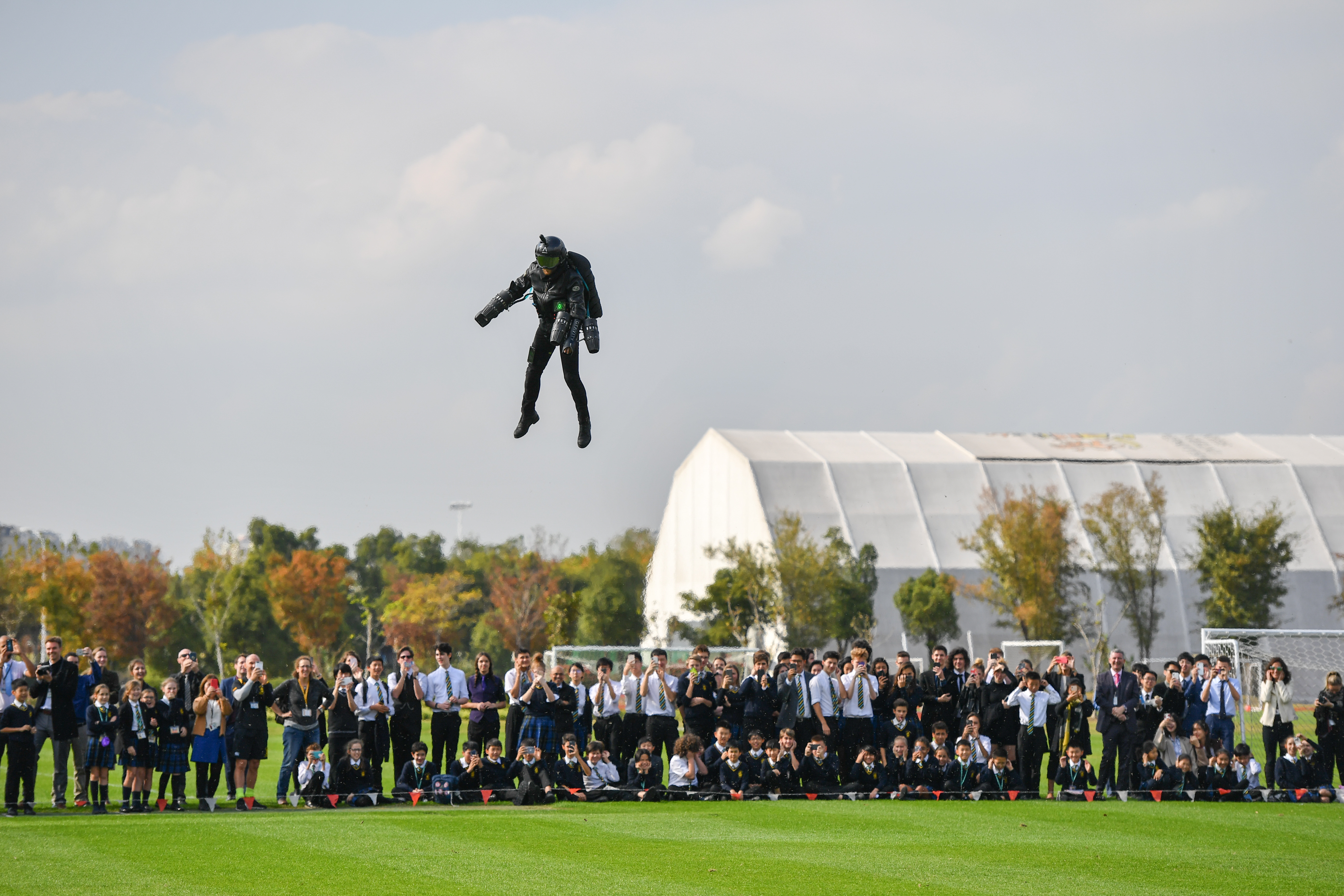 What application does the jet suit have? How do you see it being used in the future?
Richard: The suit is very fuel-intensive, so right now it’s not a very efficient way of transporting people, but it is immensely fun! So for now, its primary application is as an entertainment product. We’re actually putting together a racing event which will see some very talented athletes zipping all over a purposely designed race course to really test the technology out.
What application does the jet suit have? How do you see it being used in the future?
Richard: The suit is very fuel-intensive, so right now it’s not a very efficient way of transporting people, but it is immensely fun! So for now, its primary application is as an entertainment product. We’re actually putting together a racing event which will see some very talented athletes zipping all over a purposely designed race course to really test the technology out.
 How high can you fly wearing the suit?
Richard: Even though I usually hover quite low to the ground when I’m flying, the suit is technically capable of flying very high indeed, higher up into the atmosphere than I would feel comfortable with, because it would be too cold. The reason we haven’t tested flying at much higher altitudes yet is purely based on safety. As you’ve seen from some of my video footage, it’s very possible for me to lose my balance or for a technical issue to occur, so I’d rather be closer to the ground when that happens and hopefully not damage myself too much!
How high can you fly wearing the suit?
Richard: Even though I usually hover quite low to the ground when I’m flying, the suit is technically capable of flying very high indeed, higher up into the atmosphere than I would feel comfortable with, because it would be too cold. The reason we haven’t tested flying at much higher altitudes yet is purely based on safety. As you’ve seen from some of my video footage, it’s very possible for me to lose my balance or for a technical issue to occur, so I’d rather be closer to the ground when that happens and hopefully not damage myself too much!
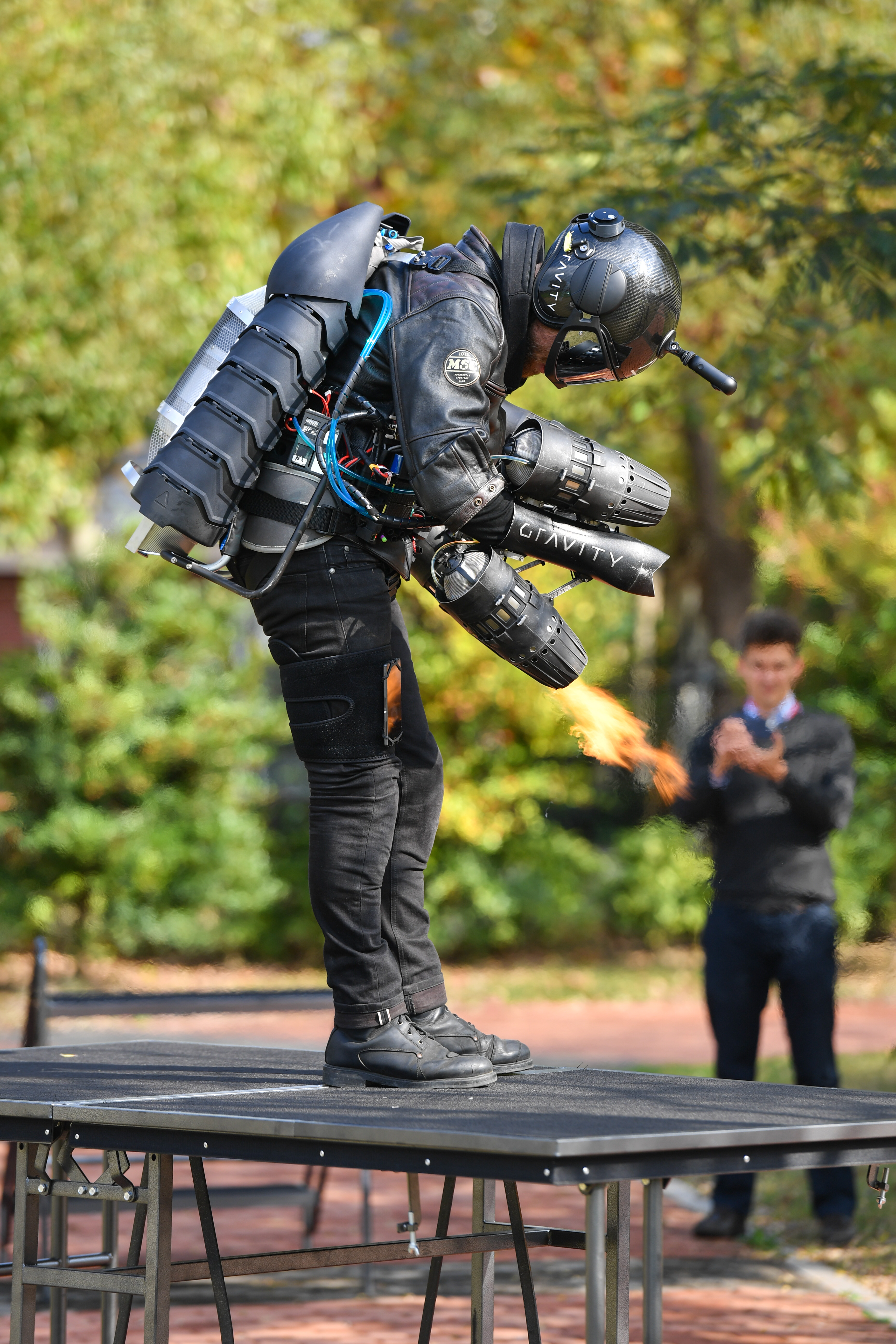 Is the suit harmful to the environment? Are you concerned about its impact on global warming?
Richard: That’s a very important question and a key consideration for our next phase of development. Again, because it currently uses so much fuel, the jet suit would make a very poor choice as a mass-produced mode of transportation. However, since there are only a handful of suits in the world, and only a couple of people using them, the impact is minimal. We’re also looking to create an electric version of the suit, which would be lighter and more environmentally friendly. There’s also a possibility that we might be able to use bio-diesel, so that’s another exciting prospect.
Is the suit harmful to the environment? Are you concerned about its impact on global warming?
Richard: That’s a very important question and a key consideration for our next phase of development. Again, because it currently uses so much fuel, the jet suit would make a very poor choice as a mass-produced mode of transportation. However, since there are only a handful of suits in the world, and only a couple of people using them, the impact is minimal. We’re also looking to create an electric version of the suit, which would be lighter and more environmentally friendly. There’s also a possibility that we might be able to use bio-diesel, so that’s another exciting prospect.
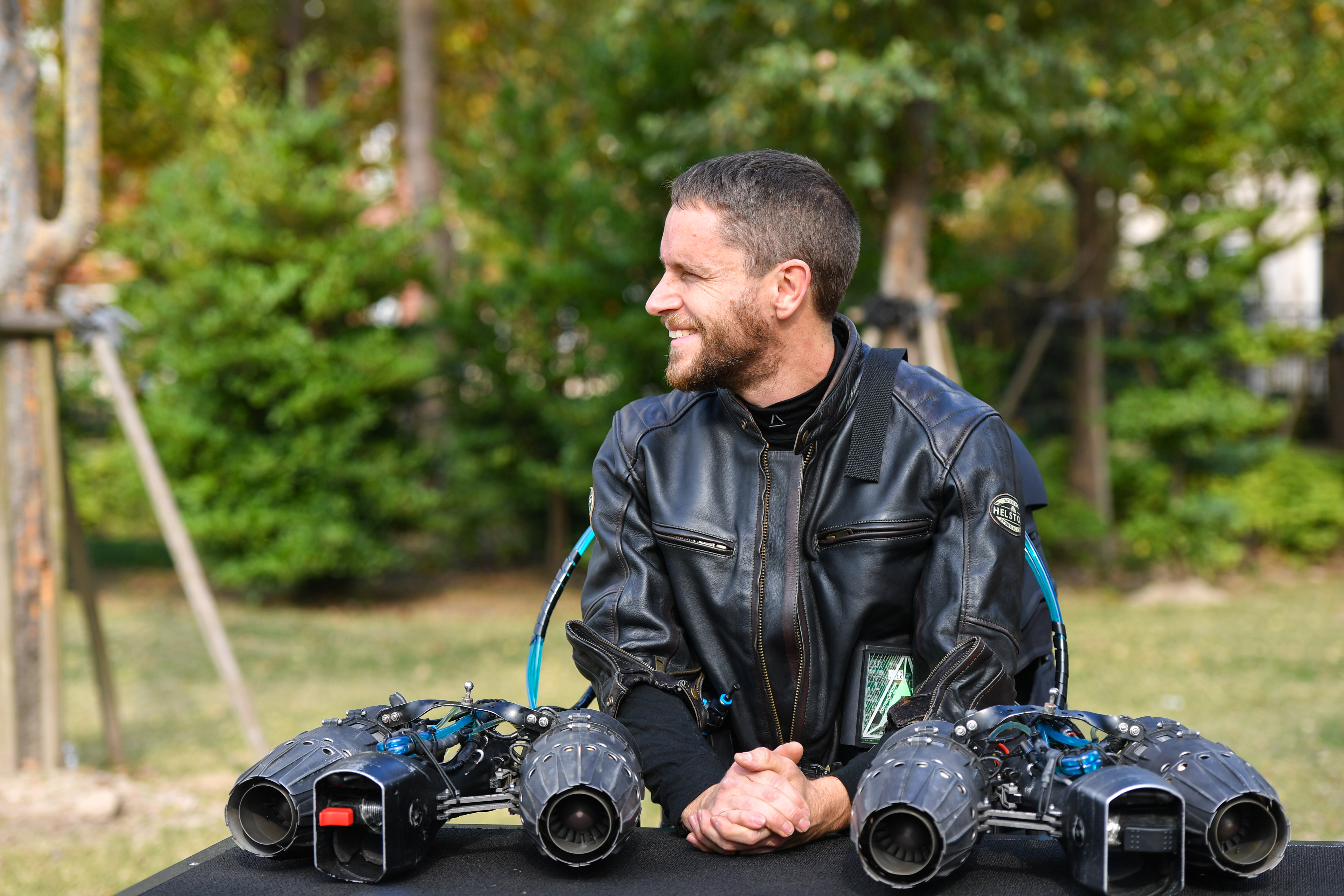 What is your advice for someone who wants to invent something?
Richard: The most important thing when inventing is to accept that there will be many, many failures involved along the way. You have to understand and accept that failing, and learning from those failures, is an essential part of the process. This also means that you have to be persistent; don’t be discouraged when things go wrong, look long and hard at what happened and think about how you can do it better next time.
Other than that, I think that an inventor needs to consider three things before they get started:
1: Can I do this safely? Is it possible to safely test my idea without taking dangerous risks to my health?
2: Can I afford to do this? Do I have the resources I need to turn my idea into a workable reality?
3: Can I do this without hurting or upsetting anyone else? Will this idea cause trouble for me with any particular group, government, or individual?
If you think you have a satisfactory answer for these three questions, then you are likely in a very good place to get started on your invention.
What is your advice for someone who wants to invent something?
Richard: The most important thing when inventing is to accept that there will be many, many failures involved along the way. You have to understand and accept that failing, and learning from those failures, is an essential part of the process. This also means that you have to be persistent; don’t be discouraged when things go wrong, look long and hard at what happened and think about how you can do it better next time.
Other than that, I think that an inventor needs to consider three things before they get started:
1: Can I do this safely? Is it possible to safely test my idea without taking dangerous risks to my health?
2: Can I afford to do this? Do I have the resources I need to turn my idea into a workable reality?
3: Can I do this without hurting or upsetting anyone else? Will this idea cause trouble for me with any particular group, government, or individual?
If you think you have a satisfactory answer for these three questions, then you are likely in a very good place to get started on your invention.
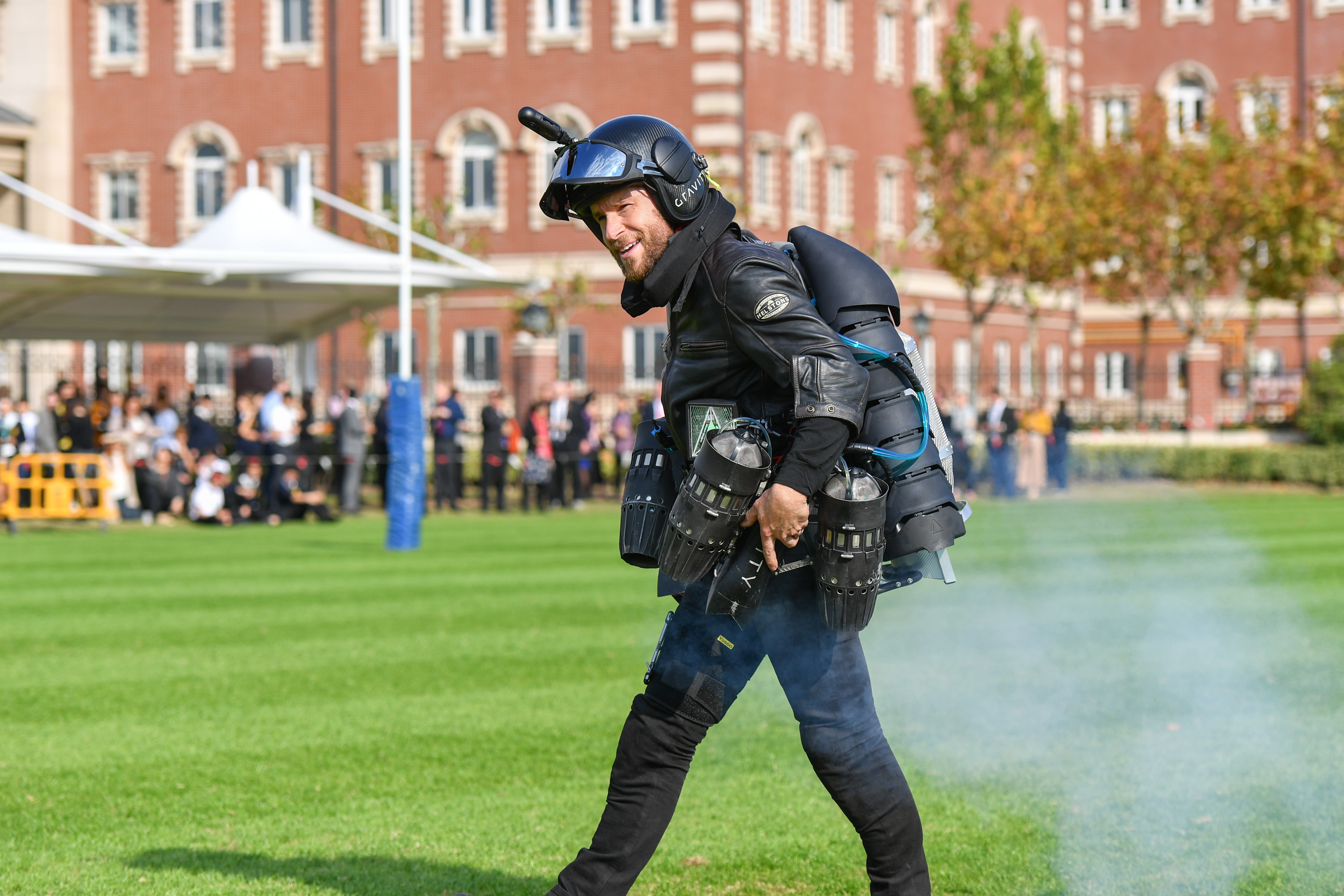 Richard is currently in China to make various demonstrations of the suit as well as gauge interest for his planned racing event, The Gravity Race Series, which he hopes will become another successful reality in the not too distant future. As you can see from the photos, the pupils got to witness the jet suit in action as Richard flew across one of the sports fields before stylishly (and safely!) landing on a platform set up at its centre.
Richard is currently in China to make various demonstrations of the suit as well as gauge interest for his planned racing event, The Gravity Race Series, which he hopes will become another successful reality in the not too distant future. As you can see from the photos, the pupils got to witness the jet suit in action as Richard flew across one of the sports fields before stylishly (and safely!) landing on a platform set up at its centre.
 Richard’s visit provided pupils a learning experience that showed them the importance of recognising the value of your own ideas and persistently following them through. Everyone attending the presentation and flight demonstration walked away inspired.
Richard’s visit provided pupils a learning experience that showed them the importance of recognising the value of your own ideas and persistently following them through. Everyone attending the presentation and flight demonstration walked away inspired.
 Richard first delivered a short presentation to a packed and buzzing College Theatre on the background, development history and technical capabilities of the jet suit, much in the style of the TED talks he has given on his incredible invention. He briefly outlined how a “bonkers” (his words!) idea to learn how to augment the human body to fly turned into a fully realised and commercially viable product within the space of around two years.
Richard first delivered a short presentation to a packed and buzzing College Theatre on the background, development history and technical capabilities of the jet suit, much in the style of the TED talks he has given on his incredible invention. He briefly outlined how a “bonkers” (his words!) idea to learn how to augment the human body to fly turned into a fully realised and commercially viable product within the space of around two years.
 Richard’s jet suit cost roughly $50,000 to develop, and utilises a lightweight exoskeleton and a combination of kerosene-fuelled micro gas turbines strapped to his arms and back to allow him to control 130kg of thrust, sufficient to propel him off the ground and actually fly for sustained periods of time. Richard himself set the Guinness World Record for “the fastest speed in a body controlled jet engine powered suit” on 9th November 2017 by travelling at roughly 32mph, a speed that he and his team have subsequently broken many times.
Richard’s jet suit cost roughly $50,000 to develop, and utilises a lightweight exoskeleton and a combination of kerosene-fuelled micro gas turbines strapped to his arms and back to allow him to control 130kg of thrust, sufficient to propel him off the ground and actually fly for sustained periods of time. Richard himself set the Guinness World Record for “the fastest speed in a body controlled jet engine powered suit” on 9th November 2017 by travelling at roughly 32mph, a speed that he and his team have subsequently broken many times.
 After the presentation, Richard kindly made time for a Q&A, where a veritable forest of hands shot up amongst the watching Wellingtonians. From the calibre of their questions, it was clear that the pupils were not only fascinated by the jet suit itself, but also its potential impact on the wider world and the very nature of inventing. The following is just a short sample of the many well-considered questions they put to Richard:
Did you think that your idea would get this far?
Richard: I hoped that it would, but you never know how these things will turn out! I think that in the back of any inventor’s mind is the knowledge that your idea may fail to come to fruition, but if you care about the idea enough, then you owe it to yourself to give it your best effort.
After the presentation, Richard kindly made time for a Q&A, where a veritable forest of hands shot up amongst the watching Wellingtonians. From the calibre of their questions, it was clear that the pupils were not only fascinated by the jet suit itself, but also its potential impact on the wider world and the very nature of inventing. The following is just a short sample of the many well-considered questions they put to Richard:
Did you think that your idea would get this far?
Richard: I hoped that it would, but you never know how these things will turn out! I think that in the back of any inventor’s mind is the knowledge that your idea may fail to come to fruition, but if you care about the idea enough, then you owe it to yourself to give it your best effort.
 What application does the jet suit have? How do you see it being used in the future?
Richard: The suit is very fuel-intensive, so right now it’s not a very efficient way of transporting people, but it is immensely fun! So for now, its primary application is as an entertainment product. We’re actually putting together a racing event which will see some very talented athletes zipping all over a purposely designed race course to really test the technology out.
What application does the jet suit have? How do you see it being used in the future?
Richard: The suit is very fuel-intensive, so right now it’s not a very efficient way of transporting people, but it is immensely fun! So for now, its primary application is as an entertainment product. We’re actually putting together a racing event which will see some very talented athletes zipping all over a purposely designed race course to really test the technology out.
 How high can you fly wearing the suit?
Richard: Even though I usually hover quite low to the ground when I’m flying, the suit is technically capable of flying very high indeed, higher up into the atmosphere than I would feel comfortable with, because it would be too cold. The reason we haven’t tested flying at much higher altitudes yet is purely based on safety. As you’ve seen from some of my video footage, it’s very possible for me to lose my balance or for a technical issue to occur, so I’d rather be closer to the ground when that happens and hopefully not damage myself too much!
How high can you fly wearing the suit?
Richard: Even though I usually hover quite low to the ground when I’m flying, the suit is technically capable of flying very high indeed, higher up into the atmosphere than I would feel comfortable with, because it would be too cold. The reason we haven’t tested flying at much higher altitudes yet is purely based on safety. As you’ve seen from some of my video footage, it’s very possible for me to lose my balance or for a technical issue to occur, so I’d rather be closer to the ground when that happens and hopefully not damage myself too much!
 Is the suit harmful to the environment? Are you concerned about its impact on global warming?
Richard: That’s a very important question and a key consideration for our next phase of development. Again, because it currently uses so much fuel, the jet suit would make a very poor choice as a mass-produced mode of transportation. However, since there are only a handful of suits in the world, and only a couple of people using them, the impact is minimal. We’re also looking to create an electric version of the suit, which would be lighter and more environmentally friendly. There’s also a possibility that we might be able to use bio-diesel, so that’s another exciting prospect.
Is the suit harmful to the environment? Are you concerned about its impact on global warming?
Richard: That’s a very important question and a key consideration for our next phase of development. Again, because it currently uses so much fuel, the jet suit would make a very poor choice as a mass-produced mode of transportation. However, since there are only a handful of suits in the world, and only a couple of people using them, the impact is minimal. We’re also looking to create an electric version of the suit, which would be lighter and more environmentally friendly. There’s also a possibility that we might be able to use bio-diesel, so that’s another exciting prospect.
 What is your advice for someone who wants to invent something?
Richard: The most important thing when inventing is to accept that there will be many, many failures involved along the way. You have to understand and accept that failing, and learning from those failures, is an essential part of the process. This also means that you have to be persistent; don’t be discouraged when things go wrong, look long and hard at what happened and think about how you can do it better next time.
Other than that, I think that an inventor needs to consider three things before they get started:
1: Can I do this safely? Is it possible to safely test my idea without taking dangerous risks to my health?
2: Can I afford to do this? Do I have the resources I need to turn my idea into a workable reality?
3: Can I do this without hurting or upsetting anyone else? Will this idea cause trouble for me with any particular group, government, or individual?
If you think you have a satisfactory answer for these three questions, then you are likely in a very good place to get started on your invention.
What is your advice for someone who wants to invent something?
Richard: The most important thing when inventing is to accept that there will be many, many failures involved along the way. You have to understand and accept that failing, and learning from those failures, is an essential part of the process. This also means that you have to be persistent; don’t be discouraged when things go wrong, look long and hard at what happened and think about how you can do it better next time.
Other than that, I think that an inventor needs to consider three things before they get started:
1: Can I do this safely? Is it possible to safely test my idea without taking dangerous risks to my health?
2: Can I afford to do this? Do I have the resources I need to turn my idea into a workable reality?
3: Can I do this without hurting or upsetting anyone else? Will this idea cause trouble for me with any particular group, government, or individual?
If you think you have a satisfactory answer for these three questions, then you are likely in a very good place to get started on your invention.
 Richard is currently in China to make various demonstrations of the suit as well as gauge interest for his planned racing event, The Gravity Race Series, which he hopes will become another successful reality in the not too distant future. As you can see from the photos, the pupils got to witness the jet suit in action as Richard flew across one of the sports fields before stylishly (and safely!) landing on a platform set up at its centre.
Richard is currently in China to make various demonstrations of the suit as well as gauge interest for his planned racing event, The Gravity Race Series, which he hopes will become another successful reality in the not too distant future. As you can see from the photos, the pupils got to witness the jet suit in action as Richard flew across one of the sports fields before stylishly (and safely!) landing on a platform set up at its centre.
 Richard’s visit provided pupils a learning experience that showed them the importance of recognising the value of your own ideas and persistently following them through. Everyone attending the presentation and flight demonstration walked away inspired.
Richard’s visit provided pupils a learning experience that showed them the importance of recognising the value of your own ideas and persistently following them through. Everyone attending the presentation and flight demonstration walked away inspired.
Related Articles

Discover & Grow at Wellington's Toddler Programme!30 Oct 2025
Give your little one (18–24 months) a joyful start in our immersive bilingual environment! Through music, art, storytelling, and outdoor play, our expert-led sessions nurture early language, motor coo
Read More

The Bamboo: A Cross-Curricular Journey in Chinese Learning22 Jan 2026
Caroline ZhangHead of Primary School ChineseHave you ever wondered how something as simple as a piece of bamboo can open up an entire world of discovery for children? In our Chinese classrooms at Wel
Read More

eMotion Dance Showcase 2025: Celebrating Creativity and Talent03 Nov 2025
The stage lights are ready — and our dancers are too. Join us for the eMotion Dance Showcase on 12 November at 5:00 PM, a celebration of creativity, leadership, and artistry within Wellingtons dance
Read More










